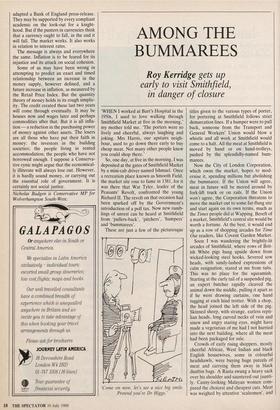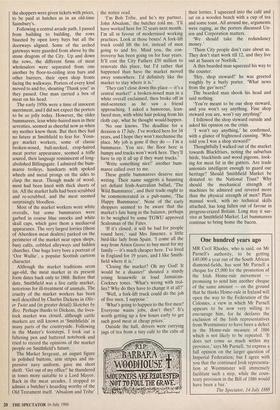AMONG THE BUMMAREES
Roy Kerridge gets up
early to visit Smithfield, in danger of closure
WHEN I worked at Bart's Hospital in the 1950s, I used to love walking through Smithfield Market at five in the morning,' my mother told me. The porters were so lively and cheerful, always laughing and joking. Mrs Harris, our upstairs neigh- bour, used to go down there early to buy cheap meat. Not many other people knew you could shop there.'
So, one day, at five in the morning, I was deposited at the gates of Smithfield Market by a mini-cab driver named Ishmael. Once a recreation place known as Smooth Field, the market site rose to fame in 1381, for it was there that Wat Tyler, leader of the Peasants' Revolt, confronted the young Richard II. The revolt on that occasion had been sparked off by the Government's introduction of a poll tax. Now new rumb- lings of unrest can be heard at Smithfield from `pullers-back', 'pitchers', 'humpers' and 'bummarees'.
These are just a few of the picturesque 'Come on now, let's see a nice big smile. Pretend you're Dr Higgs.' titles given to the various types of porter, for portering at Smithfield follows strict demarcation lines. If a humper were to pull back, someone from the Transport and General Workers' Union would blow a whistle and all work at Smithfield would come to a halt. All the meat at Smithfield is moved by hand or on hand-trolleys, pushed by the splendidly-named bum- marees.
Now the City of London Corporation, which owns the market, hopes to mod- ernise it, spending millions but abolishing the bummaree. If the Union will agree, meat in future will be moved around by fork-lift truck or on rails. If the Union won't agree, the Corporation threatens to move the market out to some far-flung site and start again on its own terms, much as the Times people did at Wapping. Bereft of a market, Smithfield's central site would be worth a fortune. At the best, it would end up as a row of shopping arcades for Time Out readers, like Covent Garden Market.
Soon I was wandering the brightly-lit arcades of Smithfield, where rows of Brit- ish White pigs hung upside down from wicked-looking steel hooks. Severed sow heads, with sandy-lashed expressions of calm resignation, stared at me from tubs. This was no place for the squeamish. Starting at the curly tail of a suspended pig, an expert butcher rapidly cleaved the animal down the middle, pulling it apart as if he were drawing curtains, one hand tugging at each hind trotter. With a chop, the head joined the left side of the pig. Skinned sheep, with strange, earless repti- lian heads, long curved necks of vein and sinew and angry staring eyes, might have made a vegetarian of me had I not hurried into the next building, where all the meat had been packaged for sale.
Crowds of early rising shoppers, mostly cheerful African, West Indian and black English housewives, some in colourful headshawls, were buying huge parcels of meat and carrying them away in black dustbin bags. A Rasta swung a heavy sack over his shoulder and sauntered out jaunti- ly. Canny-looking Malayan women com- pared the choicest and cheapest cuts. Meat was weighed by attentive 'scalesmen', and the shoppers were given tickets with prices, to be paid at hatches as in an old-time Sainsbury's.
Following a central arcade path, I passed from building to building, the rows bisected by open lorry bays but all the doorways aligned. Some of the arched gateways were guarded from above by the stone dragons of the City. Up and down the rows, the different firms of meat wholesalers were separated from one another by floor-to-ceiling iron bars and other barriers, their open shop fronts facing the walkways. Porters of every kind moved to and fro, shouting 'Thank you!' as they passed. One man carried a box of meat on his head.
The early 1950s were a time of innocent merriment, and I did not expect the porters to be so jolly today. However, the older bummarees, lean white-haired men in their seventies, seemed as cheerful now as when my mother knew them. But then they had no future at Smithfield to fear for. Youn- ger market workers, some of classic broken-nosed, bull-necked, crop-haired meat porter appearance, seemed a trifle soured, their language reminiscent of long- abolished Billingsgate. I admired the bum- maree trolleys, handcarts with spoked wheels and metal prongs on the sides to clasp the meat. Though made of wood, most had been lined with thick sheets of tin. All the market halls had been scrubbed and re-scrubbed, and the meat seemed surprisingly bloodless.
Most of the market workers wore white overalls, but some bummarees were garbed in coarse blue smocks and white skull caps, which gave them a mediaeval appearance. The very largest lorries (those of Aberdeen meat dealers) parked on the perimeter of the market near open shops, busy cafés, cobbled alleyways and hidden churches. One huge lorry bore a portrait of `Oor Wullie', a popular Scottish cartoon character.
Although the market traditions seem age-old, the meat market in its present form dates back only to 1868. Before that date, Smithfield was a live cattle market, notorious for ill-treatment of animals. The cruelty of the market workers has been well described by Charles Dickens in Oliv- er Twist and (in greater detail) Sketches by Boz. Perhaps thanks to Dickens, the lives- tock market was closed, although cattle markets are still known as `Smithfields' in many parts of the countryside. Following in the Master's footsteps, I took out a faltering pen and battered notebook and tried to record the opinions of the market people on Smithfield's future.
The Market Sergeant, an august figure in polished buttons, arm stripes and im- pressive navy uniform, gave me short shrift. 'Get out of my office!' he thundered in tones more suitable to a Lord Mayor. Back in the meat arcades, I stopped to admire a butcher's hoarding worthy of the Old Testament itself. 'Absalom and Tribe' the notice read.
`I'm Bob Tribe, and he's my partner, John Absalom,' the butcher told me. 'I'll have worked here for 32 years next month. I'm all in favour of modernised working practices. Look at those boxes! A fork-lift truck could lift the lot, instead of men going to and fro. Mind you, the con- troversy has been going on for four years. It'll cost the City Fathers £50 million to renovate this place, but I'd rather that happened than have the market moved away somewhere. I'd definitely like the market to stay where it is.'
`They can't close down this place — it's a central market!' a broken-nosed man in a white overall exclaimed, then broke off in mid-sentence as he saw a friend approaching. I asked a humorous, lean- faced man, with white hair poking from his cloth cap, what he thought would happen.
`No one knows. The deadline for a decision is 17 July. I've worked here for 34 years, and I hope they won't mechanise the place. My job is gone if they do — I'm a bummaree. You see, the floor here is bumpy and trucks won't work here. They'll have to rip it all up if they want trucks.'
`Write something nice!' another bum- maree called over to me.
These gentle bummarees deserve nice writing. Their name suggests a haunting yet defiaht Irish-Australian ballad, 'The Wild Bummaree', and their trade ought to be commemorated in a pub-name, 'The Happy Bummaree'. None of the early shoppers seemed to be aware that the market's fate hung in the balance, perhaps to be weighed by some TGWU approved Scalesman of the Fates.
`If it's closed, it will be bad for people round here,' said Mrs Jimenez, a little bird-like lady from Spain. 'I come all the way from Amos Grove to buy meat for my family — it's much cheaper here. I've lived in England for 19 years, and I like Smith- field where it is.'
`Closing the market? Oh my God! It would be a disaster!' shouted a sturdy young housewife in loud Jamaican- Cockney tones. 'What's wrong with trol- lies? Why do they have to change it at all?'
`Well, a fork-lift truck could do the job of five men, I suppose.'
`What's going to happen to the five men? Everyone wants jobs, don't they? It's worth getting up a few hours early to get such good meat at cheap prices.'
Outside the hall, drivers were carrying jugs of tea from a tiny café to the cabs of their lorries. I squeezed into the café and sat on a wooden bench with a cup of tea and some toast. All around me, arguments were raging, as the porters discussed Un- ion and Corporation matters.
`We should take the redundancy money.'
`Them City people don't care about us. They don't start work till 12, and they live out at Sussex or Norfolk.'
A thin bearded man squeezed his way to the counter.
`Hey, shop steward!' he was greeted roughly by a burly porter. 'What news from the guv'nors?'
The bearded man shook his head and said nothing.
`You're meant to be our shop steward, and you won't say anything. Fine shop steward you are, won't say anything!'
I followed the shop steward outside and asked his opinion on the crisis.
`I won't say anything,' he confirmed, with a glance of frightened cunning. 'Who told you I was a shop steward?'
Thoughtfully I walked out of the market towards Blackfriars, noting the suburban birds, blackbirds and wood pigeons, look- ing for meat fat in the gutters. Are trade unionists intelligent enough to guard our heritage? Should Smithfield Market be donated to the National Trust? Why should the mechanical strength of machines be admired and revered more than the physical strength of men? Plain manual work, with no technical skills attached, has long fallen out of favour in progress-crazed Britain. Long may it sur- vive at Smithfield Market. Let bummarees continue to bring home the bacon.



















































 Previous page
Previous page